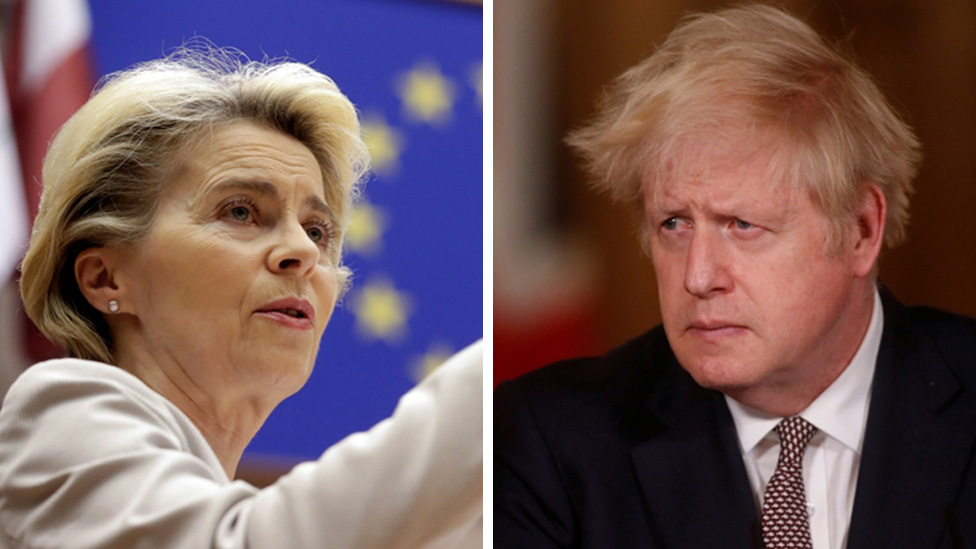
The EU and UK are continuing talks on post-Brexit trade, amid mounting speculation that they are close to agreeing a deal.
BBC political editor Laura Kuenssberg said it was looking "very likely" the two sides were "heading towards" an agreement.
But this was "not signed and sealed", with "haggling" going on, she added.
Disputes over fishing rights and business competition rules remain the key hurdles to reaching a deal.
An EU official close to the talks said: "It is crunch time. But talk of a deal announcement is premature."
And a Downing Street source said it was "possible but far from certain" that an agreement could be secured later on Wednesday.
The two sides have until 31 December, when the UK leaves EU trading rules, to reach a deal and then get it approved - or ratified - by parliamentarians.
If this does not happen by then, they could place import taxes on each other's goods, potentially affecting prices.
UK chief negotiator Lord Frost and Stephanie Riso, a senior member of the EU team, are understood still to be in discussions in Brussels.
EU sources said UK Prime Minister Boris Johnson and European Commission President Ursula von der Leyen had also been in contact in an attempt to break the deadlock before the expected pause in negotiations for Christmas.

The basics
- Brexit happened but rules didn't change at once: The UK left the European Union on 31 January 2020, but leaders needed time to negotiate a deal for life afterwards - they got 11 months.
- Talks are happening: The UK and the EU have until 31 December 2020 to agree a trade deal as well as other things, such as fishing rights.
- If there is no deal: Border checks and taxes will be introduced for goods travelling between the UK and the EU. But deal or no deal, we will still see changes.

The UK insists on having control over fishing in its waters from 1 January and retaining a larger share of the catch from them than under the current quota system.
But the EU wants to phase in a new fishing system over a longer period and retain more of its access to UK waters for boats from France, Spain and other member states.
EU chief negotiator Michel Barnier said on Tuesday that a "final push" was taking place, amid reports the EU had made a last offer on fishing which would see it accept a 25% reduction in its access to the UK's market.
Ireland's Taoiseach (Prime Minister) Micheál Martin said the UK was pushing for 35% reduction instead, adding that negotiations were "all down to fish, it would appear right now".
He also raised the prospect of UK and EU officials working on Christmas Day, adding that he and other leaders were on "standby" to give their backing to any deal that might emerge.
The UK has said it is prepared to keep talking until 31 December but is prepared for any outcome, while EU diplomats have suggested the bloc would be willing to continue negotiations into 2021 if necessary.
But ministers have repeatedly ruled out any extension to the transition period, under which the UK has continued to follow Brussels's trade rules since it left the EU on 31 January.
https://news.google.com/__i/rss/rd/articles/CBMiL2h0dHBzOi8vd3d3LmJiYy5jby51ay9uZXdzL3VrLXBvbGl0aWNzLTU1NDIyNzI50gEzaHR0cHM6Ly93d3cuYmJjLmNvLnVrL25ld3MvYW1wL3VrLXBvbGl0aWNzLTU1NDIyNzI5?oc=5
2020-12-23 16:20:00Z
52781259169935
Tidak ada komentar:
Posting Komentar